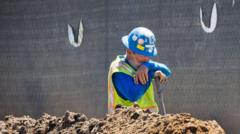This website uses cookies so that we can provide you with the best user experience possible. Cookie information is stored in your browser and performs functions such as recognising you when you return to our website and helping our team to understand which sections of the website you find most interesting and useful.


Job growth in the US was weaker than expected last month, raising concern that the world's largest economy is starting to stumble under the weight of higher interest rates.
Employers added 142,000 jobs in August, less than the roughly 160,000 analysts had forecast, the Labor Department said. It also said job gains in the previous two months were lower than initially estimated.
However, the unemployment rate fell back, dropping to 4.2% from 4.3% in July.
The report is one of the most important gauges of the US economy and comes at a critical time, as voters weigh presidential candidates for the November election and the US central bank debates its first cut to interest rates in four years.
Analysts said the latest figures kept the Federal Reserve on track for a rate cut at its meeting this month, but would do little to resolve questions about the direction of the US economy or how big a cut it should make.
"Rarely has there been such a make or break number – unfortunately, today’s jobs report doesn’t entirely resolve the recession debate," said Seema Shah, chief global strategist at Principal Asset Management.
Soaring prices in 2022 prompted the Federal Reserve to raise its key lending rate to 5.3%, a roughly 20-year high.
Faced with higher borrowing costs for homes, cars and other debt, the economy has slowed, helping to ease pressures that were fuelling inflation, but adding to market jitters.
As inflation has subsided, falling to 2.9% in July, the Fed is now under pressure to cut rates and ward off further economic slowing.
The job gains in August, although below estimates, were higher than July, when a slowdown sparked fears and prompted several days of stock market turmoil.
Construction and health care firms led the hiring last month, while manufacturers and retailers got rid of roles.
Ms Shah said the data in Friday's report was mixed, but contained enough worrying signs that the Fed should make a bigger cut.
"On balance, with inflation pressures subdued, there is no reason for the Fed not to err on the side of caution and frontload rate cuts," she said.
But others said the gains were just steady enough to warrant a 0.25 percentage point cut, as markets have long predicted - though it might be a sign of more cuts than expected in the months ahead.
The Fed's decision would be "close run", said Paul Ashworth, chief North America economist for Capital Economics.
"The labour market is clearly experiencing a marked slowdown," he said, adding that the latest figures were "overall still consistent with an economy experiencing a soft landing rather than plummeting into recession".
The concerns about the economy are a key issue in the US election.
Polls suggest that a majority of Americans already believe the US is experiencing a recession, despite solid 2.5% growth last year.
Donald Trump has claimed that the economy is headed for a "crash" and his campaign quickly seized on the latest figures to attack vice president Kamala Harris, issuing a press release titled "warning lights flash as Kamala's economy keeps weakening".
Democrats have defended their record, arguing that the US weathered the pandemic and inflation better than many other countries.
They say that the slowdown is a sign of an economy returning to a more sustainable pace of growth after the post-pandemic boom.
"Although hiring has slowed, the US job market continues to generate solid job gains and wage growth that is consistently beating inflation," the White House Council of Economic Advisors said in a blog.



 Africana55 Radio
Africana55 Radio 
